- Home
- Samuel Beckett
Three Novels Page 6
Three Novels Read online
Page 6
Martha had been a long time in my service. I was often away from home. I had never taken leave of her in this way, but always offhandedly, even when a prolonged absence was to be feared, which was not the case on this occasion. Sometimes I departed without a word to her.
Before going into my son’s room I went into my own. I still had the cigar in my mouth, but the pretty ash had fallen off. I reproached myself with this negligence. I dissolved a sleeping-powder in the milk. He asked for a report, he’ll get his report. I was going out with the tray when my eyes fell on the two albums lying on my desk. I wondered if I might not relent, at any rate so far as the album of duplicates was concerned. A little while ago he had come here to fetch the thermometer. He had been a long time. Had he taken advantage of the opportunity to secure some of his favourite stamps? I had not time to check them all. I put down the tray and looked for a few stamps at random, the Togo one mark carmine with the pretty boat, the Nyassa 1901 ten reis, and several others. I was very fond of the Nyassa. It was green and showed a giraffe grazing off the top of a palm-tree. They were all there. That proved nothing. It only proved that those particular stamps were there. I finally decided that to go back on my decision, freely taken and clearly stated, would deal a blow to my authority which it was in no condition to sustain. I did so with sorrow. My son was already sleeping. I woke him. He ate and drank, grimacing in disgust. That was all the thanks I got. I waited until the last drop, the last crumb, had disappeared. He turned to the wall and I tucked him in. I was within a hair’s breadth of kissing him. Neither he nor I had uttered a word. We had no further need of words, for the time being. Besides my son rarely spoke to me unless I spoke to him. And when I did so he answered but lamely and as it were with reluctance. And yet with his little friends, when he thought I was out of the way, he was incredibly voluble. That my presence had the effect of dampening this disposition was far from displeasing me. Not one person in a hundred knows how to be silent and listen, no, nor even to conceive what such a thing means. Yet only then can you detect, beyond the fatuous clamour, the silence of which the universe is made. I desired this advantage for my son. And that he should hold aloof from those who pride themselves on their eagle gaze. I had not struggled, toiled, suffered, made good, lived like a Hottentot, so that my son should do the same. I tiptoed out. I quite enjoyed playing my parts through the bitter end.
Since in this way I shirked the issue, have I to apologize for saying so? I let fall this suggestion for what it is worth. And perfunctorily. For in describing this day I am once more he who suffered it, who crammed it full of futile anxious life, with no other purpose than his own stultification and the means of not doing what he had to do. And as then my thoughts would have none of Molloy, so tonight my pen. This confession has been preying on my mind for some time past. To have made it gives me no relief.
I reflected with bitter satisfaction that if my son lay down and died by the wayside, it would be none of my doing. To every man his own responsibilities. I know of some they do not keep awake.
I said, There is something in this house tying my hands. A man like me cannot forget, in his evasions, what it is he evades. I went down to the garden and moved about in the almost total darkness. If I had not known my garden so well I would have blundered into my shrubberies, or my beehives. My cigar had gone out unnoticed. I shook it and put it in my pocket, intending to discard it in the ash-tray, or in the waste-paper basket, later on. But the next day, far from Turdy, I found it in my pocket and indeed not without satisfaction. For I was able to get a few more puffs out of it. To discover the cold cigar between my teeth, to spit it out, to search for it in the dark, to pick it up, to wonder what should I do with it, to shake it needlessly and put it in my pocket, to conjure up the ash-tray and the waste-paper basket, these were merely the principal stages of a sequence which I spun out for a quarter of an hour at least. Others concerned the dog Zulu, the perfumes sharpened tenfold by the rain and whose sources I amused myself exploring, in my head and with my hands, a neighbour’s light, another’s noise, and so on. My son’s window was faintly lit. He liked sleeping with a night-light beside him. I sometimes felt it was wrong of me to let him humour this weakness. Until quite recently he could not sleep unless he had his woolly bear to hug. When he had forgotten the bear (Baby Jack) I would forbid the night-light. What would I have done that day without my son to distract me? My duty perhaps.
Finding my spirits as low in the garden as in the house, I turned to go in, saying to myself it was one of two things, either my house had nothing to do with the kind of nothingness in the midst of which I stumbled or else the whole of my little property was to blame. To adopt this latter hypothesis was to condone what I had done and, in advance, what I was to do, pending my departure. It brought me a semblance of pardon and a brief moment of factitious freedom. I therefore adopted it.
From a distance the kitchen had seemed to be in darkness. And in a sense it was. But in another sense it was not. For gluing my eyes to the window-pane I discerned a faint reddish glow which could not have come from the oven, for I had no oven, but a simple gas-stove. An oven if you like, but a gas-oven. That is to say there was a real oven too in the kitchen, but out of service. I’m sorry, but there it is, in a house without a gas-oven I would not have felt easy. In the night, interrupting my prowl, I like to go up to a window, lit or unlit, and look into the room, to see what is going on. I cover my face with my hands and peer through my fingers. I have terrified more than one neighbour in this way. He rushes outside, finds no one. For me then from their darkness the darkest rooms emerge, as if still instant with the vanished day or with the light turned out a moment before, for reasons perhaps of which less said the better. But the gloaming in the kitchen was of another kind and came from the night-light with the red chimney which, in Martha’s room, adjoining the kitchen, burned eternally at the feet of a little Virgin carved in wood, hanging on the wall. Weary of rocking herself she had gone in and lain down on her bed, leaving the door of her room open so as to miss none of the sounds in the house. But perhaps she had gone to sleep.
I went upstairs again. I stopped at my son’s door. I stooped and applied my ear to the keyhole. Some apply the eye, I the ear, to keyholes. I heard nothing, to my great surprise. For my son slept noisily, with open mouth. I took good care not to open the door. For this silence was of a nature to occupy my mind, for some little time. I went to my room.
It was then the unheard of sight was to be seen of Moran making ready to go without knowing where he was going, having consulted neither map nor time-table, considered neither itinerary nor halts, heedless of the weather outlook, with only the vaguest notion of the outfit he would need, the time the expedition was likely to take, the money he would require and even the very nature of the work to be done and consequently the means to be employed. And yet there I was whistling away while I stuffed into my haversack a minimum of effects, similar to those I had recommended to my son. I put on my old pepper-and-salt shootingsuit with the knee-breeches, stockings to match and a pair of stout black boots. I bent down, my hands on my buttocks, and looked at my legs. Knock-kneed and skeleton thin they made a poor show in this accoutrement, unknown locally I may add. But when I left at night, for a distant place, I wore it with pleasure, for the sake of comfort, though I looked a sight. All I needed was a butterfly-net to have vaguely the air of a country schoolmaster on convalescent leave. The heavy glittering black boots, which seemed to implore a pair of navy-blue serge trousers, gave the finishing blow to this get-up which otherwise might have appeared, to the uninformed, an example of well-bred bad taste. On my head, after mature hesitation, I decided to wear my straw boater, yellowed by the rain. It had lost its band, which gave it an appearance of inordinate height. I was tempted to take my black cloak, but finally rejected it in favour of a heavy massive-handled winter umbrella. The cloak is a serviceable garment and I had more than one. It leaves great freedom of movement to the arms and at the same time conceals them. An
d there are times when a cloak is so to speak indispensable. But the umbrella too has great merits. And if it had been winter, or even autumn, instead of summer, I might have taken both. I had already done so, with most gratifying results.
Dressed thus I could hardly hope to pass unseen. I did not wish to. Conspicuousness is the A B C of my profession. To call forth feelings of pity and indulgence, to be the butt of jeers and hilarity, is indispensable. So many vent-holes in the cask of secrets. On condition you cannot feel, nor denigrate, nor laugh. This state was mine at will. And then there was night.
My son could only embarrass me. He was like a thousand other boys of his age and condition. There is something about a father that discourages derision. Even grotesque he commands a certain respect. And when he is seen out with his young hopeful, whose face grows longer and longer and longer with every step, then no further work is possible. He is taken for a widower, the gaudiest colours are of no avail, rather make things worse, he finds himself saddled with a wife long since deceased, in child-bed as likely as not. And my antics would be viewed as the harmless effect of my widowhood, presumed to have unhinged my mind. I boiled with anger at the thought of him who had shackled me thus. If he had desired my failure he could not have devised a better means to it. If I could have reflected with my usual calm on the work I was required to do, it would perhaps have seemed of a nature more likely to benefit than to suffer by the presence of my son. But let us not go back on that. Perhaps I could pass him off as my assistant, or a mere nephew. I would forbid him to call me papa, or show me any sign of affection, in public, if he did not want to get one of those clouts he so dreaded.
And if I whistled fitfully while revolving these lugubrious thoughts, I suppose it was because I was happy at heart to leave my house, my garden, my village, I who usually left them with regret. Some people whistle for no reason at all. Not I. And while I came and went in my room, tidying up, putting back my clothes in the wardrobe and my hats in the boxes from which I had taken them the better to make my choice, locking the various drawers, while thus employed I had the joyful vision of myself far from home, from the familiar faces, from all my sheet-anchors, sitting on a milestone in the dark, my legs crossed, one hand on my thigh, my elbow in that hand, my chin cupped in the other, my eyes fixed on the earth as on a chessboard, coldly hatching my plans, for the next day, for the day after, creating time to come. And then I forgot that my son would be at my side, restless, plaintive, whingeing for food, whingeing for sleep, dirtying his drawers. I opened the drawer of my night-table and took out a full tube of morphine tablets, my favourite sedative.
I have a huge bunch of keys, it weighs over a pound. Not a door, not a drawer in my house but the key to it goes with me, wherever I go. I carry them in the right-hand pocket of my trousers, of my breeches in this case. A massive chain, attached to my braces, prevents me from losing them. This chain, four or five times longer than necessary, lies, coiled, on the bunch, in my pocket. Its weight gives me a list to the right, when I am tired, or when I forget to counteract it, by a muscular effort.
I looked round for the last time, saw that I had neglected certain precautions, rectified this, took up my haversack, I nearly wrote my bagpipes, my boater, my umbrella, I hope I’m not forgetting anything, switched off the light, went out into the passage and locked my door. That at least is clear. Immediately I heard a strangling noise. It was my son, sleeping. I woke him. We haven’t a moment to lose, I said. Desperately he clung to his sleep. That was natural. A few hours’ sleep however deep are not enough for an organism in the first stages of puberty suffering from stomach trouble. And when I began to shake him and help him out of bed pulling him first by the arms, then by the hair, he turned away from me in fury, to the wall, and dug his nails into the mattress. I had to muster all my strength to overcome his resistance. But I had hardly freed him from the bed when he broke from my hold, threw himself down on the floor and rolled about, screaming with anger and defiance. The fun was beginning already. This disgusting exhibition left me no choice but to use my umbrella, holding it by the end with both hands. But a word on the subject of my boater, before I forget. Two holes were bored in the brim, one on either side of course, I had bored them myself, with my little gimlet. And in these holes I had secured the ends of an elastic long enough to pass under my chin, under my jaws rather, but not too long, for it had to hold fast, under my jaws rather. In this way, however great my exertions, my boater stayed in its place, which was on my head. Shame on you, I cried, you ill-bred little pig! I would get angry if I were not careful. And anger is a luxury I cannot afford. For then I go blind, blood veils my eyes and I hear what the great Gustave heard, the benches creaking in the court of assizes. Oh it is not without scathe that one is gentle, courteous, reasonable, patient, day after day, year after year. I threw down my umbrella and ran from the room. On the stairs I met Martha coming up, capless, dishevelled, her clothes in disorder. What’s going on? she cried. I looked at her. She went back to her kitchen. Trembling I hastened to the shed, seized my axe, went into the yard and began hacking madly at an old chopping-block that lay there and on which in winter, tranquilly, I split my logs. Finally the blade sank into it so deeply that I could not get it out. The efforts I made to do so brought me, with exhaustion, calm. I went upstairs again. My son was dressing. He was crying. Everybody was crying. I helped him put on his knapsack. I told him not to forget his raincoat. He began to put it in his knapsack. I told him to carry it over his arm, for the moment. It was nearly midnight. I picked up my umbrella. Intact. Get on, I said. He went out of the room which I paused for a moment to survey, before I followed him. It was a shambles. The night was fine, in my humble opinion. Scents filled the air. The gravel crunched under our feet. No, I said, this way. I entered the little wood. My son floundered behind me, bumping into the trees. He did not know how to find his way in the dark. He was still young, the words of reproach died on my lips. I stopped. Take my hand, I said. I might have said, Give me your hand. I said, Take my hand. Strange. But the path was too narrow for us to walk abreast. So I put my hand behind me and my son grasped it, gratefully I fancied. So we came to the little wicket-gate. It was locked. I unlocked it and stood aside, to let my son precede me. I turned back to look at my house. It was partly hidden by the little wood. The roof’s serrated ridge, the single chimney-stack with its four flues, stood out faintly against the sky spattered with a few dim stars. I offered my face to the black mass of fragrant vegetation that was mine and with which I could do as I pleased and never be gainsaid. It was full of songbirds, their heads under their wings, fearing nothing, for they knew me. My trees, my bushes, my flowerbeds, my tiny lawns, I used to think I loved them. If I sometimes cut a branch, a flower, it was solely for their good, that they might increase in strength and happiness. And I never did it without a pang. Indeed if the truth were known, I did not do it at all, I got Christy to do it. I grew no vegetables. Not far off was the hen-house. When I said I had turkeys, and so on, I lied. All I had was a few hens. My grey hen was there, not on the perch with the others, but on the ground, in a corner, in the dust, at the mercy of the rats. The cock no longer sought her out to tread her angrily. The day was at hand, if she did not take a turn for the better, when the other hens would join forces and tear her to pieces, with their beaks and claws. All was silent. I have an extremely sensitive ear. Yet I have no ear for music. I could just hear that adorable murmur of tiny feet, of quivering feathers and feeble, smothered clucking that hen-houses make at night and that dies down long before dawn. How often I had listened to it, entranced, in the evening, saying, Tomorrow I am free. And so I turned again a last time towards my little all, before I left it, in the hope of keeping it.
In the lane, having locked the wicket-gate, I said to my son, Left. I had long since given up going for walks with my son, though I sometimes longed to do so. The least outing with him was torture, he lost his way so easily. Yet when alone he seemed to know all the short cuts. When I sent him to the
grocer’s, or to Mrs. Clement’s, or even further afield, on the road to V for grain, he was back in half the time I would have taken for the journey myself, and without having run. For I did not want my son to be seen capering in the streets like the little hooligans he frequented on the sly. No, I wanted him to walk like his father, with little rapid steps, his head up, his breathing even and economical, his arms swinging, looking neither to left nor right, apparently oblivious to everything and in reality missing nothing. But with me he invariably took the wrong turn, a crossing or a simple corner was all he needed to stray from the right road, it of my election. I do not think he did this on purpose. But leaving everything to me he did not heed what he was doing, or look where he was going, and went on mechanically plunged in a kind of dream. It was as though he let himself be sucked in out of sight by every opening that offered. So that we had got in the habit of taking our walks separately. And the only walk we regularly took together was that which led us, every Sunday, from home to church and, mass over, from church to home. Caught up then in the slow tide of the faithful my son was not alone with me. But he was part of that docile herd going yet again to thank God for his goodness and to implore his mercy and forgiveness, and then returning, their souls made easy, to other gratifications.
I waited for him to come back, then spoke the words calculated to settle this matter once and for all. Get behind me, I said, and keep behind me. This solution had its points, from several points of view. But was he capable of keeping behind me? Would not the time be bound to come when he would raise his head and find himself alone, in a strange place, and when I, waking from my reverie, would turn and find him gone? I toyed briefly with the idea of attaching him to me by means of a long rope, its two ends tied about our waists. There are various ways of attracting attention and I was not sure that this was one of the good ones. And he might have undone his knots in silence and escaped, leaving me to go on my way alone, followed by a long rope trailing in the dust, like a burgess of Calais. Until such time as the rope, catching on some fixed or heavy object, should stop me dead in my stride. We should have needed, not the soft and silent rope, but a chain, which was not to be dreamt of. And yet I did dream of it, for an instant I amused myself dreaming of it, imagining myself in a world less ill contrived and wondering how, having nothing more than a simple chain, without collar or band or gyves or fetters of any kind, I could chain my son to me in such a way as to prevent him from ever shaking me off again. It was a simple problem of toils and knots and I could have solved it at a pinch. But already I was called elsewhere by the image of my son no longer behind me, but before me. Thus in the rear I could keep my eye on him and intervene, at the least false movement he might make. But apart from having other parts to play, during this expedition, than those of keeper and sick-nurse, the prospect was more than I could bear of being unable to move a step without having before my eyes my son’s little sullen plump body. Come here! I cried. For on hearing me say we were to go to the left he had gone to the left, as if his dearest wish was to infuriate me. Slumped over my umbrella, my head sunk as beneath a malediction, the fingers of my free hand between two slats of the wicket, I no more stirred than if I had been of stone. So he came back a second time. I tell you to keep behind me and you go before me, I said.

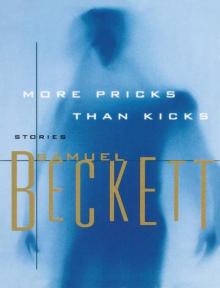 More Pricks Than Kicks
More Pricks Than Kicks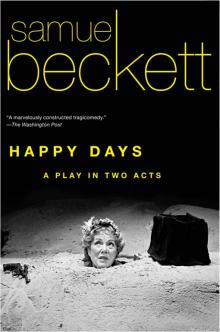 Happy Days
Happy Days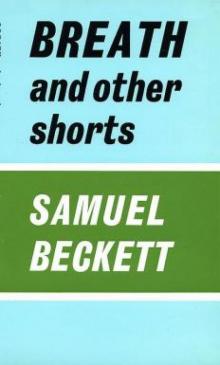 Breath, and Other Shorts
Breath, and Other Shorts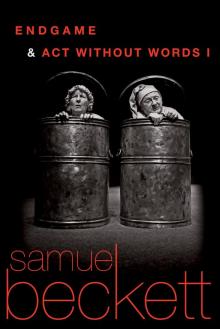 Endgame & Act Without Words
Endgame & Act Without Words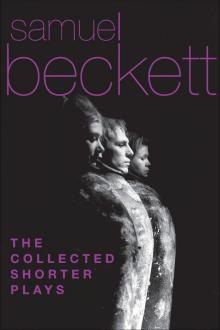 The Collected Shorter Plays of Samuel Beckett
The Collected Shorter Plays of Samuel Beckett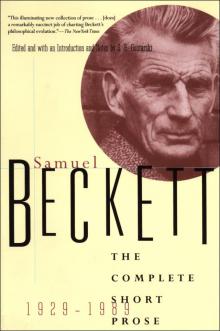 The Complete Short Prose, 1929-1989
The Complete Short Prose, 1929-1989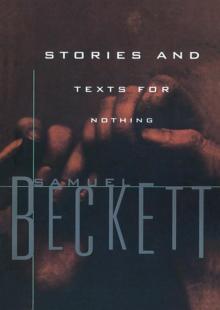 Stories and Texts for Nothing
Stories and Texts for Nothing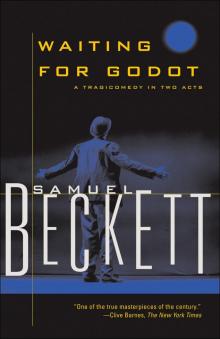 Waiting for Godot
Waiting for Godot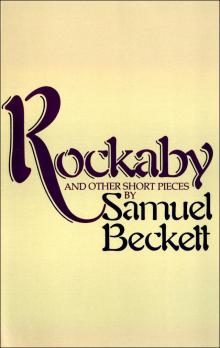 Rockaby and Other Short Pieces
Rockaby and Other Short Pieces First Love and Other Shorts
First Love and Other Shorts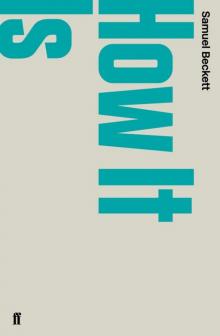 How It Is
How It Is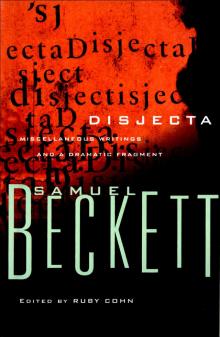 Disjecta: Miscellaneous Writings and a Dramatic Fragment
Disjecta: Miscellaneous Writings and a Dramatic Fragment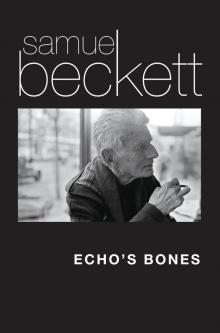 Echo's Bones
Echo's Bones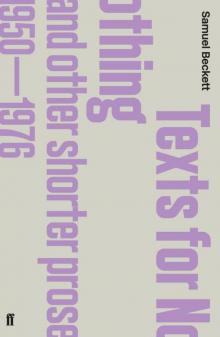 Texts for Nothing and Other Shorter Prose 1950-1976
Texts for Nothing and Other Shorter Prose 1950-1976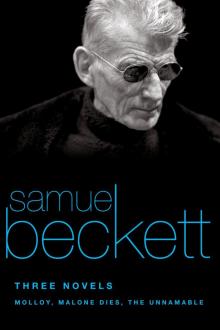 Three Novels
Three Novels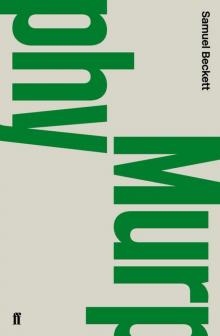 Murphy
Murphy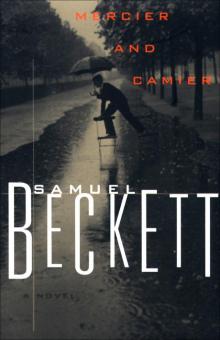 Mercier and Camier
Mercier and Camier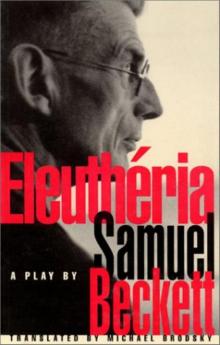 Eleuthéria
Eleuthéria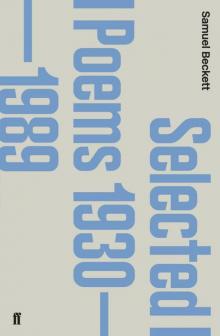 Selected Poems 1930-1988
Selected Poems 1930-1988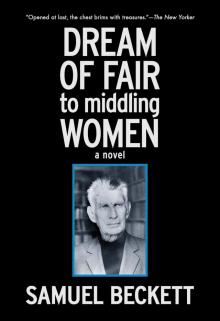 Dream of Fair to Middling Women
Dream of Fair to Middling Women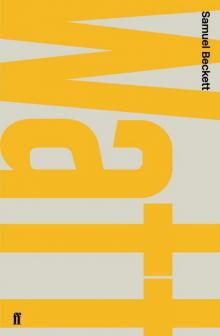 Watt
Watt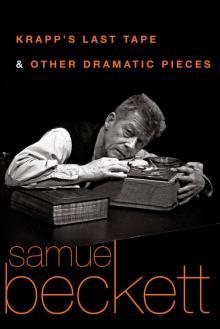 Krapp's Last Tape and Other Dramatic Pieces
Krapp's Last Tape and Other Dramatic Pieces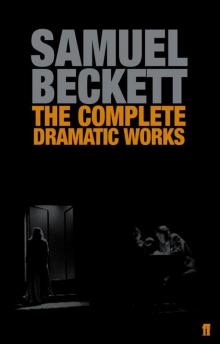 The Complete Dramatic Works of Samuel Beckett
The Complete Dramatic Works of Samuel Beckett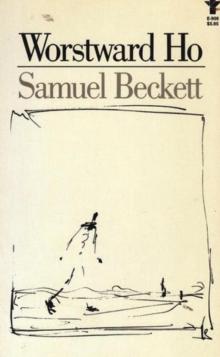 Worstward Ho
Worstward Ho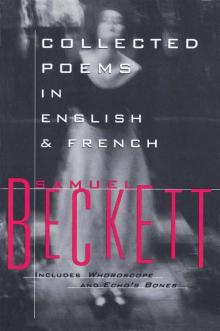 Collected Poems in English and French
Collected Poems in English and French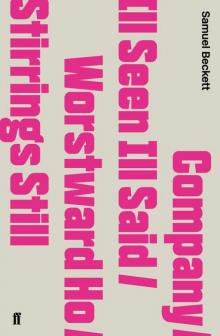 Company / Ill Seen Ill Said / Worstward Ho / Stirrings Still
Company / Ill Seen Ill Said / Worstward Ho / Stirrings Still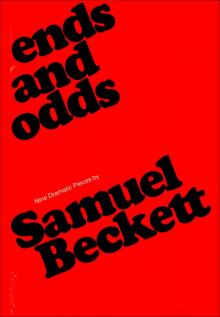 Ends and Odds
Ends and Odds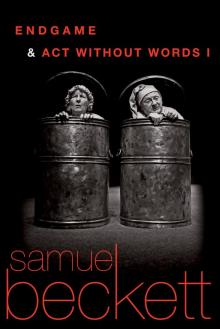 Endgame Act Without Words I
Endgame Act Without Words I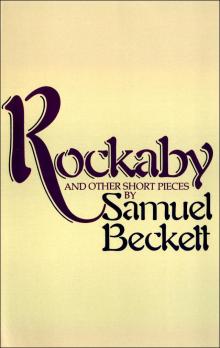 Rockabye and Other Short Pieces
Rockabye and Other Short Pieces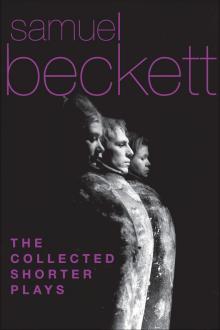 The Collected Shorter Plays
The Collected Shorter Plays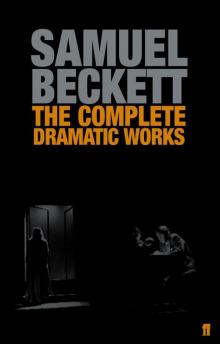 The Complete Dramatic Works
The Complete Dramatic Works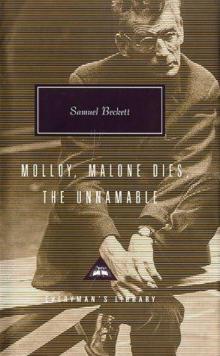 Three Novels: Malloy, Malone Dies, The Unnamable
Three Novels: Malloy, Malone Dies, The Unnamable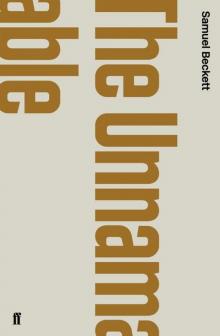 The Unnamable
The Unnamable